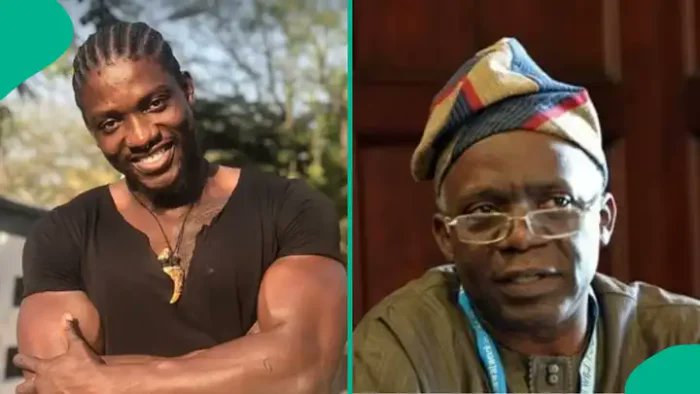
COURT CLEARS VDM: Defamation Suit by Femi Falana and Falz Struck Out

In a dramatic turn of events at the Ikeja High Court today, the defamation lawsuit filed by prominent human rights lawyer, Femi Falana (SAN), and his son, popular rapper and activist Folarin Falana, known professionally as Falz, against social media personality Martins Otse, widely known as Verydarkblackman (VDM), has been struck out.
The ruling, which came after weeks of public attention and heated social media discourse, marks a significant moment in the ongoing conversation surrounding freedom of expression, online activism, and the legal boundaries of public commentary. The courtroom was tense as the judge delivered the decision, stating that the suit failed to meet the requirements necessary for it to proceed to full trial.
The case had stirred considerable public interest since it first surfaced, largely due to the high-profile nature of the complainants. Femi Falana, a revered Senior Advocate of Nigeria, is known for his fearless defense of human rights and constitutionalism, while his son Falz is a household name in the Nigerian entertainment industry, admired for his music and vocal stance on social justice issues. Their joint legal move against VDM, a controversial and unapologetically blunt online commentator, had been viewed by many as a test case for the limits of digital expression in Nigeria.
According to court records, the Falanas had alleged that VDM made defamatory statements on his social media platforms that were not only injurious to their reputations but also dangerous to their professional and public images. They contended that the comments made by the defendant crossed the line from fair criticism into character assassination, and thus warranted judicial intervention.
However, in what appeared to be a surprise to both parties, the presiding judge ruled that the claims lacked sufficient legal grounding to justify further court action. While the court did not go into the full details of its reasoning in open session, legal experts present inferred that the dismissal was likely based on either procedural deficiencies or insufficient proof of malicious intent, which is a critical element in defamation cases.
The defendant, Verydarkblackman, who had earlier vowed to fight the case to the very end, was present in court and could not contain his joy as the ruling was announced. Speaking outside the courthouse, he expressed deep gratitude for what he described as a "victory for truth and the common man."
“I knew I was innocent,” VDM said to a crowd of supporters and journalists. “This is not just a win for me, it’s a win for everyone who uses their voice to speak out against injustice, even when it's uncomfortable.”
The content creator, who is known for his unfiltered and often controversial takes on trending issues, emphasized that his intent was never to defame but to call attention to what he sees as inconsistencies and double standards within Nigeria’s socio-political system. He maintained that his criticisms, including those directed at high-profile figures like the Falanas, are rooted in a desire for accountability, not personal vendetta.
Reacting to the court’s decision, representatives of the Falana legal team declined to comment on whether they would appeal the judgment or pursue other legal avenues. However, a source close to the family hinted that the matter might not end here, suggesting that further legal review could be on the horizon.
The dismissal of the case has once again ignited debate about the tension between free speech and defamation in Nigeria’s digital landscape. With social media becoming a dominant space for activism, public discourse, and even citizen journalism, the boundaries of lawful expression are continually being tested. Legal practitioners note that while the constitution guarantees freedom of expression, it also provides for the protection of individual reputation, creating a delicate balancing act for courts to manage.
Today’s ruling could potentially set a precedent for how similar cases will be treated in the future. Many observers believe the outcome might embolden other content creators and online influencers who often find themselves on the receiving end of legal threats due to their outspoken opinions. On the other hand, some argue that the decision could also create room for reckless commentary without consequence if not carefully monitored.
Social media was instantly ablaze with reactions following the news of the court's decision. Hashtags such as #VDM, #Falz, and #Falana trended nationwide as supporters of both camps voiced their opinions. While fans of VDM celebrated what they called a “landmark victory,” supporters of the Falanas expressed disappointment and concern over what they see as a growing lack of respect for elder statesmen and national figures.
In the aftermath of the verdict, analysts say the real question moving forward is whether the ruling will encourage more civil engagement or fuel further divisions in the already polarized space of online commentary. They note that while the legal victory is clear, the broader societal implications are still unfolding.
As for VDM, he has hinted that this may be only the beginning of a broader campaign to “challenge hypocrisy and protect freedom of expression” in the country. Whether that campaign will be met with more applause or legal firepower remains to be seen.
Today’s courtroom decision may have brought a legal battle to an end, but it has also opened a wider conversation about voice, power, and the limits of the law in the age of digital discourse. For now, Martins Otse walks free—not just in the eyes of the court, but also in the eyes of the many Nigerians who view him as a symbol of a new era of fearless expression.


